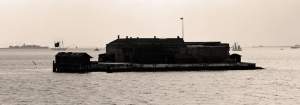Record Data
Source citation
Reprinted in T.M. Harris, Assassination of Lincoln: A History of the Great Conspiracy... (Boston, MA: American Citizen Company, 1892), 133.
Type
Judicial record
Date Certainty
Exact
Transcriber
John Osborne, Dickinson College
Transcription date
Transcription
The following text is presented here in complete form, as it originally appeared in print. Spelling and typographical errors have been preserved as in the original.
After my escape from Johnson's Island I went to Canada, where I met a number of Confederates. They asked me if I was willing to go on an expedition. I replied: ' Yes, if it is in the service of my country.' They said: ' It is all right,' but gave me no intimation of its nature, nor did I ask for any. I was then sent to New York, where I stayed some time. There were eight men of our party, of whom two fled to Canada. After we had been in New York three weeks we were told that the object of our expedition was to retaliate on the North for the atrocities in the Shenandoah Valley. It was designed to set fire to the city on the night of the Presidential election; but the phosphorus was not ready, and it was put off until the 25th of November. I was stopping at the Belmont House, but moved into Prince Street. -I set fire to four places — in Barnum's Museum, Lovejoy's Hotel, Tammany Hotel, and the New England House. The others merely started fires in the house where each one was lodging, and then ran off. Had they all done as I did, we would have had thirty-two fires and played a huge joke on the fire department. I know that I am to be hung for setting fire to Barnum's Museum, but that was only a joke. I had no idea of doing it. I had been drinking and went in there with a friend, and, just to scare the people, I emptied a bottle of phosphorus on the floor. We knew it would not set fire to the wood, for we had tried it before, and at one time had concluded to give the thing up. There was no fiendishness about it. After setting fire to my four places, I walked the streets all night, and went to the Exchange Hotel early in the morning. We all met there that morning and the next night. My friend and I had rooms there, but we sat in the office nearly all the time reading the papers, while we were watched by the detectives, of whom the hotel was full. I expected to die then, and if I had it would have been all right; but now it seems rather hard. I escaped to Canada and was glad enough when I crossed the bridge in safety. I desired, however, to return to my command, and started with my friend for the Confederacy via Detroit. Just before entering the city he received an intimation that the detectives were on the look-out for us, and giving me the signal he jumped from the cars. I did not notice the signal, but kept on and was arrested in the depot. I wish to say that the killing of women and children was the last thing thought of. We wanted to let the people of the North understand that there were two sides to this war, and that they could not be rolling in
wealth and comfort while we at the South were bearing all the hardships and privations. In retaliation for Sheridan's atrocities in the Shenandoah Valley,
we desired to destroy property; not the lives of women and children, although that would, of course, have followed in its train.
Done in the presence of Lieut. Col. Martin Burke and J. Howard, Jr.
March 24th, 1865, 10.30 p.m.

